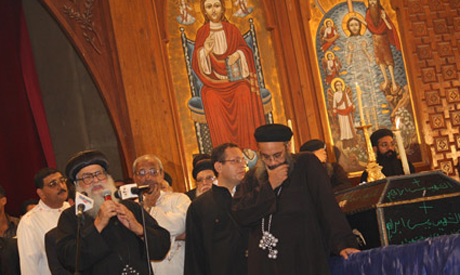
Coptic priests lead sermons to mourn victims of Bloody Sunday (Photo: Mai Shaheen)
A huge funeral sermon for the victims of Sunday’s deadly clashes between protesting Copts and their supporters and military forces was held at Cairo’s Abbassiya Cathedral on Monday.
Grieved, enraged and frustrated, thousands of Christians and Muslim supporters watched in awe as coffins of the casualties kept coming from the nearby Coptic Hospital where bodies of the dead were held over night.
Pope Shenouda III was among the priests who gave hymns while praying for yesterday’s dead, while Anba Moussa, the Coptic Orthodox Archbishop of Youth, gave the statement of the Holy Synod, asking Egypt’s Copts to pray and fast for three days starting tomorrow.
“I would like to ask all Copts not to resort to violence,” he said, before adding, “apparently, there are no new procedures for our interest; we have been suffering the same problems over and over again.”
Thousands of Christians chanted slogans defending their religion and deploring the “neglect and persecution Copts have long suffered from”.
Other angry mourners chanted against the Supreme Council of the Armed Forces (SCAF) and the Field Marshal, Hussien Tantawi, the de facto ruler of Egypt, whom they hold responsible for the deaths of young people they said were peacefully demanding equal rights.
Copts at the Cathedral clearly felt great bitterness over the incident, widely regarded the worst since the January 25 Revolution. For hours, they emotionally recited hymns and verses from the Bible while holding aloft crosses and shedding tears.
Michel Agib, one of the scouts at the Cathedral, gave statements to Ahram Online that by far reflected a great deal of faith. Yet, in the same breath, he seemed to be critical of the Army.
“It was mentioned in the Bible that we will be hated by everyone; this is the destiny that will lead us to paradise,” 24-year-old Michel Agib, one of the scouts, told Ahram Online. “The army shouldn’t have killed all these people, under any circumstances.
“The march was peaceful. I went there knowing that there is a huge possibility that I would die … If we had been strong enough to open fire at the army as some people claim, we wouldn’t have let our churches get destroyed,” he added.
Rami Attef said he was one of the protesters who had been injured at the hands of the army. His foot in bandages, he recounted what happened to him: “Bullets were whizzing past, much too close for comfort.
“My foot was injured because a military truck ran over it. This truck turned around and wanted to run me over but people carried me out of the way…We will never expect the army to protect us ever again.”
Hesham Fathi, a 46-year-old businessman, reiterated that march was peaceful, blaming the violence – like many others – on thuggish-looking infiltrators. “Women and children were in the march in Shubra; there were no troublemakers at all.
“I had to leave early to take an elderly man home but I received phone calls from other protesters I know, saying they found people holding rifles coming from Sabtia Street and chambilion Street. Ten minutes later, all hell broke loose.
“I would say some people inside the military council are behind what happened; some of them are loyal to the remnants of the overthrown regime ... Life is really tough now for Christians. Some Muslims just don’t want them in the country.”
Priest Raphael Nazmi echoed the same sentiment, saying, “Some extremist sheikhs call on Muslims not to greet Copts; others even demand our expulsion. Such calls are quite common in the sermons of Friday prayers held in rundown districts.”
Short link: